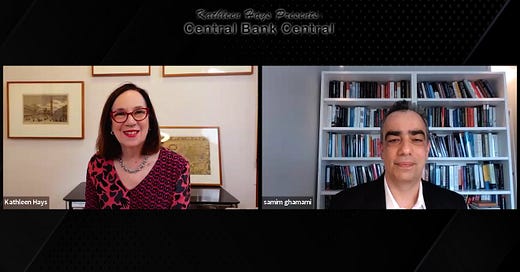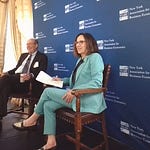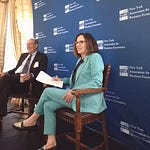Samim Ghamami is an economist at the Securities and Exchange Commission who is known for work in government and on Wall Street that marries macroeconomics and finance. inflation and the U.S. government bond market. In fact for his work as an economist at the Securities and Exchange Commission he has been a recipient of the SEC Chair’s Award for Excellence because of his work on Treausry market reforms.
]
So who better to speak with than him when Treasury bond investors and traders are wringing their hands over what looks to many like an inevitable rise in the U.S. debt-to GDP ratio that could push the Fed to let inflation rise a bit to easre the burde of payhing it off. And there are concerns that tariff policies could interrupt the flow of funds into the US that actively support the U.S. treasury market.
Adding to all of these fiscal forces are big questions hanging over the the Federal Reserve as it faces another chance to shift its monetary policy framework agreement in ways that could impact the outlook for interest rates, inflation and the market for US treasury securities
Samim and I took a deep dive into all of these issues and more. Dive in and hear why he trusts the Fed to maintain its inflation fight no matter what, and the most important thing that can be done to help them to that is for the government “to move toward a more balanced budget approach.” And if this does not happen, and we do reach a pont where the U.S. deficit becomes unstainable, “that would make the work of the Fed extremely difficult.”
As for private credit, which he sees posting “unprecedented growth” of late, hear why he sees it as still in good shape now but worth close watching by regulators.
Importantly, Samim wants everyone to know this about everything he says in our interview:
The SEC disclaims responsibility for any private publication or statement of any SEC employee or Commissioner. Ghamami’s views do not necessarily reflect those of the Commission, its staff, or Commissioners.
To Start: Balance The Budget or come closer 00:02:57.440
I think I mean it is well known, probably you know better than me that the trajectory of the debt to GDP ratio, and in general the Us. Public debt and deficit is not sustainable. and I think it is well known that the 1st most important thing to do is to move toward a more balanced budget approach. If that materializes, then I think an inflation targeting central bank, the Fed in the US that uses that essentially uses interest, rate rules for price. Stability can work normally otherwise.
Precise measurement of danger points is not possible 00:04:36.690
So I think it is extremely difficult to put an estimate or number or a threshold on when the debt to GDP would pass this threshold < of safety>. <if that happened> then the Fed would be challenged to proceed with its dual mandate, price, stability, and maximum employment. I think it's better to as many good economists have pointed out to focus on the trajectory of the of the debt to GDP ratio. Today, it's more than 120%. We all know the CBO estimates are, I mean, frankly scary, and we also know that the CBO may actually underestimate the debt to debt to GDP ratio 10 years from now, 15 years from now.
Last framework agreement set the Fed up for mistakes 00:06:36.260 Sure, I think I mean going back to 2020 experience. We now all know that I mean to some extent. Naturally, the Fed actions were a function of the zero lower bond experience meaning for more than several years we had extremely low inflation, lLow interest rates, nominal and negative real interest rates, and that I mean, as you know, led to the revision of the Fed Monetary Policy framework in September 2020, which has, 2 components, flexible average inflation targeting aggressive focus on maximum employment. I think that experience led essentially the fed to have some. I mean slow reaction to the rise of inflation after the covid crisis, after the covid shock.
Fiscal Excess undercuts even Taylor Rule- 00:08:29.220
From my personal perspective, I think what is probably these days even more important than the focus on the so-called Taylor <Rule> having price, sustainability, maximum employment based on an interest rate rule is the fact that we don't have fiscal sustainability when debt and deficit trajectories won't be sustainable. That interest rate rule may not work well in achieving price stability and maintaining maximum employment.
Tight Money Paradox- 00:09:21.710
I mean, this is, you may know, or have heard about it. This is something that some of the good economists refer to this phenomenon as the so-called tight money paradox. I mean more than 20 years ago. , the basic idea is simple. When you have explosion of debt to Gdp. : Under a interest rate rule that is aggressively anti-inflationary, then the interest, payment, and the debt service may ultimately lead to the spiral of inflation as opposed to fighting the inflation and trying to move it back to the target. So now we all know that there is this whole renewed theory of fiscal theory of the price level. Without going to any details of that, I think the relatively simple intuition is that the interest rates rule the Taylor principle, particularly the aggressive version of that in maintaining price, stability would work well only when we have the so-called Ricardian equivalence in simple terms, meaning only when debt to GDP. Ratio, public debt and deficit in general are on a sustainable trajectory.
Flexibility is good; employment focus is not 00:11:09.900
I personally completely agree with maintaining the flexible average inflation, targeting piece of that, while many disagree with that. If you're interested, we can discuss that more. But, like many others, I in the camp, that I think it is not good for the fed to focus aggressively on maximum employment.
Forward-looking Pre-emption Forward guidance 00:17:15.780
The emphasis on fed being forward looking. some emphasis on policy being preemptive as opposed to just focusing on actual inflation to react to inflation, I completely agree with that the use of explicit forward guidance, however, should be constrained.
US-China imbalance is unsustainable 00:20:46.780
In my view. the global imbalances situation, trade situation, particularly the surplus deficit situation between us and China. I completely agree that this is not sustainable, and something needs to be done about that. I also think that, compared to other currencies. The Us. Dollar at times tend to be a bit overvalued.
A benign reset? 00:24:25.730
My hope is that the global trading system and the global financial system could be reset in a way that the reserve currency status of the Us. Dollar won't be diminished even in the in the long run. But I'm absolutely concerned about that, like many others. Yeah.
Private Credit 00:28:18.910
Before I mention from my personal perspective what private credit would need more? Let me just mention that again, going back to the Post Global Financial Crisis Bank regulatory reforms. I think it has been a natural evolution of the financial system. Since then, large US Banks don't provide credit to small and medium sized companies and businesses the way that they did before the global financial crisis, and the slack has been filled with direct lending companies different forms of private credit funds. So that's the benefit of the whole private Credit Sector providing credit to businesses that are mostly medium sized, small-to-medium sized in terms of regulation and supervision of the private credit sector. I think transparency is the key. So if policymakers, regulators would be able to find ways so that different private credit entities, provide more information, balance, sheet information to regulators and policymakers so that they can monitor developments in the private credit sector. Then we can make sure that in a future crisis this whole asset class private credit wouldn't be become an amplifier of financial instability.
Private credit has surged- 00:30:45.630
The growth of private credit in the past 10- to 15-years has been unprecedented. So it's now somewhere around one and a half to 2 trillion dollars. But it is still small compared to the total. US debt to non-financial corporates
Linkages are a double-edged sword in the sector 00:31:57.260
Our observation has been that in the presence of private credit entities, the financial system has evolved to be more interconnected. So having higher levels of interconnectedness is good in normal times or under small negative shocks. But under large negative shocks to the economic and financial system, private credit entities could amplified risk to financial stability.
The debt will not be inflated away 00:36:00.616
I'm confident that they won't. the official sector wouldn't do anything to inflate away the debt because I mean you. I mean, correctly pointed out the situation with the global status of the Us. Dollar. So part of the reason behind us being able to issue debt, and that being absorbed by the foreigners has been the remarkable stability around prices and inflation in the US. So if that to some extent be jeopardized, I think that would be a huge challenge for the status of the Us. Dollar and debt.
Policy Nirvana 00:37:21.430
Yeah, I I think the ideal scenario would be the Us. Treasury moving toward a balanced budget trajectory and the fed focusing on its dual mandate price stability, maintaining maximum employment. I think that that would be the ideal scenario, and I hope that continue to be materialized in the future.
Samim Ghamami
Samim Ghamami is currently an economist at the U.S. Securities and Exchange Commission, Division of Economic and Risk Analysis (DERA), where he has been working with the SEC Chair and leadership team on the reform of the US Treasury market and several other capital market initiatives and rules. Ghamami is a recipient of the SEC Chair’s Award for Excellence because of his work on Treasury market reforms. The Chair’s Award recognizes individuals who have displayed exceptional commitment to excellence and produced exceptional improvements in the SEC’s programs or management.
Ghamami is also a senior researcher and an adjunct professor of finance at New York University and has been a senior researcher at UC Berkeley Center for Risk Management Research and the Department of Economics. He is also a senior advisor at SOFR Academy.
Ghamami is a member of the Economic Club of New York and the Bretton Woods Committee. He has also served on the advisory board of the Mathematics in Finance Program at NYU Courant Institute. Ghamami has been a senior economist and a senior strategist at Goldman Sachs and Millennium Management. He has also been an adjunct associate professor of economics at Columbia University. In 2019, Ghamami moved to the Financial Services Forum through Goldman Sachs, where he was the senior economist and managing director. Ghamami has also been an associate director and a senior economist at the U.S. Department of the Treasury, Office of Financial Research, and an economist at the Board of Governors of the Federal Reserve System.
Ghamami’s work has broadly focused on the interplay of finance and macroeconomics, and on quantitative finance and financial economics. His work on asset management, economic policy, financial stability, financial regulation, banking, digital asset markets, and central clearing has been presented and discussed at central banks and international financial institutions. He has discussed and presented his work at the Financial Times’ Global Banking Summit and the Financial Times’ Outstanding Directors Exchange events. Ghamami has been an advisor to the Bank for International Settlements and has worked as an expert with the Financial Stability Board on post-financial crisis reforms. He has also served on the National Science Foundation panels on Financial Mathematics.
Ghamami has also been a visiting scholar at the Department of Economics at UC Berkeley, a senior quantitative researcher at MSCI, a financial economist at Barclays, an adjunct professor at the University of Southern California, and a post-doctoral researcher at the CREATE Homeland Security Center.
Ghamami received his Ph.D. in Mathematical Finance and Operations Research from USC in 2009. His publications have appeared in different journals including Management Science, Journal of Applied Probability, Mathematics of Operations Research, Journal of Financial Intermediation, Journal of Credit Risk, Journal of Derivatives, Probability in the Engineering and Informational Sciences, Quantitative Finance, Journal of Risk, and International Journal of Financial Engineering. Ghamami holds a Master of Science (2003) from the University of Tehran in Operations Research and a Bachelor of Science (2000) from the Iran University of Science and Technology in Operations Research and Industrial Engineering.














Share this post